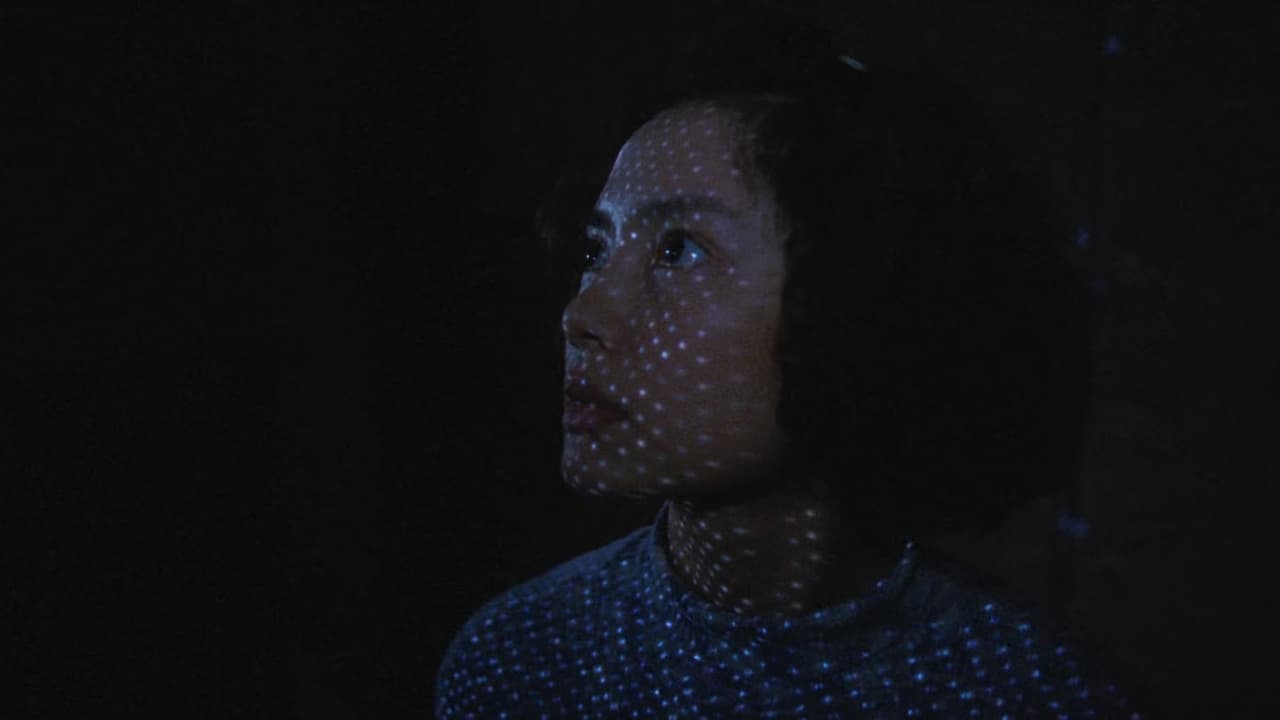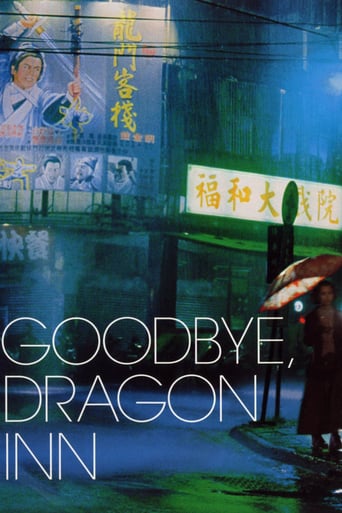

A tone poem on the nature of cinema as an entity, an art-form and a place, Ming-Liang Tsai's "Goodbye, Dragon Inn" is unlike almost any other film you will see. To say it will appeal mostly to people who love cinema may not necessarily be true for here is a film that challenges what many people believe cinema should be; entertainment perhaps, something communal and if we view it as a means of expression surely that expression should be more universal than what we get here and yet for many of us, "Goodbye, Dragon Inn" will strike us as being intensely personal. For many, this is a film that will stir up what drew us to cinema in the first place.It's almost totally silent, reminding us that in its infancy cinema was silent. We hear snatches of dialogue from the film within the film, (the martial arts classic "Dragon Inn"), that is being shown in the cinema where almost all of 'the action' takes place but there are no sub-titles. There are only a handful of characters in this cavernous auditorium but they don't communicate. If there is any unification between these people it's through the medium of cinema. There is the lame woman who acts as ticket collector and cleaner, the projectionist, an elderly man and his grandson and a number of gay men who cruise the cinema for sex, (though far from explicit these scenes have a remarkable homo-erotic charge making this an essential gay film), and perhaps a ghost.You could say, of course, that few of these people are there to see the film but were Duane and Sonny there to watch "Red River" in "The Last Picture Show" or was it just a ritual that has to be adhered to as part of a larger scheme, (in their case, growing up; here staving off loneliness). It's also a film about looking; seeing this in a cinema not unlike the one on screen we become part of the experience and it is clear from the extracts from "Dragon Inn" that Ming-Liang Tsai is very much in love with movies.Nothing really happens and the film moves at a snail's pace yet this is the least boring of art-house movies; it's an immersive experience and whether you see it alone or with others, if you have any feeling for cinema at all, you can't fail but to be touched by it though I suspect, for many, it will be like watching paint dry.
... View MoreWhile this art film may seem simple, long, and boring, it actually captures a melancholy about the reality of the art of film. Using overlong shots, static moments in time, the director gives glimpses into the dissolution of the cinema as a collective human experience. Set in a large Taiwan movie theater which once, probably, was filled daily, the film shows the demise, the last gasp, of the art form of cinema. This cinema, showing the great King Hu film "Dragon Inn" on its last day (lying that it is just closing for a short time) is in decline. The only people who haunt the cinema now are lost souls, seeking far more real human experiences than what is offered from the screen. Life has become too difficult to enjoy the offerings of art. Oddly, the film makes me think of the French film "Irma Vep" which sees the cinema reduced to a way of getting French filmmakers off the unemployment roles. In contrast, Tsai Ming-Liang fixates on the other side of the screen, the audience. Today, most of the audience is staying home, relying on the video rental store or video-on-demand via cable, mail, or internet. Few still haunt the physical cinema for anything less than a big teen event movie.Here, Tsai affectionately looks at what is left of the grand cinema. He has carefully constructed a set of characters who are lost in time. Foremost among them is the theater crew. Wonderfully fleshed out in a few moments is the performance of Shiang-chyi Chen (the beautiful star of "I Don't Want to Sleep Alone" and "What Time Is It Over There?") as the lonely club-foot ticket seller. Her desire in life is to be noticed by the projectionist of the theater but lacks any ability to make her desire known. The young projectionist himself is too self-absorbed in the fact that the cinema is haunted, which is always true of theaters.The audience is made up of two factions: those there for reasons other than the cinema and those who long for the true cinema experience of the old days. The cinema has always been a refuge for those who could not find their longings in reality. Here we have the Japanese tourist seeking a homosexual encounter and the peanut eating woman, seeking some kind of experience, sexual or otherwise, dominate the audience. Years ago, they would have blended in, hardly noticed. The child, chomping popcorn alone, becomes a potential victim of this. At one point an old man appears, sitting next to him, causing us to fear for his safety, though this man might be his grandfather, based on age. The third angle is the handsome older man who is only interested in the film being shown. In the end, the film makes us want to know more about these people, to wish they will find their heart's desire, while we are watching. To see some happy ending. Tsai refuses to give us this satisfaction.While it is a challenge to watch, it is a short (82 minute) excursion into a world many of us enjoyed as young people and is losing ground in the world of home entertainment, a world which separates us from a communal experience which, for good or bad, brought us together and gave satisfaction in experiencing art and drama as a community.SPOILER: Sort of a spoiler. Though you would have to know "Dragon Inn" since it is hard to catch from the film itself, the revelation that two of the audience members are actual actors from King Hu's epic film, seeing the film after many years, and waxing momentarily poetic on the fact that the film is as forgotten as they are, is poignant and painful. It leaves us with the fact that the cinema theater is gone, dead. The only person watching the film to watch the film was a child chomping on popcorn. What has happening to our world?
... View MoreThere are few cinemas which deal with the obsession of cinema and cinema halls and yet showing the decaying of cinematic culture as new technology has wiped the projector based 'Run-of-the-mill cinema halls. Goodbye, Dragon Inn is a cinema which stands for the urban alienation of people, the decaying culture of cinema and also showing in an uncanny style of cinematography the audience in this case most of them are homosexuals or people seeking sexual companionship. Goodbye dragon inn is stripped of bare essentials such as emotions, jazzy editing and any sort of background music. There is no plot except for a cinema hall showing a martial arts movie in a rainy day over Taiwan. The event of cinema takes place over 2 - 3 hours and has unnamed characters. One lady ticket collector who with a limp manages the theater but is not the owner. Tsai in a unique and subtle way shows the audience during the course of the movie where there is hardly a few people. One of them seeking to brush with other men in the cinema hall and is somewhat repulsed by women or their gross antiques of chewing food in a noisily fashion in the theater. But the whole film has so much more and is in the least entertaining. This cinema is what one would call life reflecting art. This is a cinema made for people reflecting the future in a mysterious way where decadence has made a lot of cinema halls go out of business. Everyone talks of nostalgia but there is none when it comes to reviving old cinema in the halls. It makes us wonder if a martial arts movie cannot drag a handful audience in a rainy day, can a n obscure or lesser known cinema do any better in a normal day. Tsai also takes a swoop on the people who go their for their vested interests. Surprisingly most of them are homosexuals.A very slow pacing cinema which has a few scenes and done in a extremely minimalist fashion unflattering it in the same instance. Though it has long shot of an empty cinema hall for a few minutes which baffled me. But it made me wonder, does the director wants to show the emptiness of it ? This is one of the best films which I have seen which deals with cinema. Cinema is dead, Long Live Cinema.
... View MoreIn over a half century of movie-going, I don't recall ever seeing a film like this. Whether you love it or hate it--I loved it--depends entirely on individual tastes. So I could fully understand someone rating it as either a 10 or a 1, or anywhere in between.The films happenings, or lack thereof, have been adequately described by other reviewers, so I won't go into that here. This is a film in which very little happens, but at the same time everything happens. It is elegiac, and a spirit of sadness and melancholy pervade the film. Many reviewers have criticized the length of some of the takes. A handicapped young woman who appears to have a brace on her leg--we can't see it, but we can hear it--climbs a long flight of stairs with excruciating slowness. The camera watches her from a distance as she climbs every step, with a 'clunk' every time her foot lands on a step. It sounds boring but it's ingenious. How better to empathize with this woman, to realize with a shock what an excruciating grind her daily life must be, and how lonely she must be. Indeed, everyone in the film appears to be lonely, and each has mechanisms for staving it off. Going to the movies is one of them.One much-discussed scene has the camera, apparently from the vantage point of the screen, look out at the completely empty theater for what is probably three or four minutes. Absolutely nothing happens. But this scene is the essence of the film. It seems to be saying, "look at the history here. Look at how many thousands of people have come here to watch the movies, how many were made happy, if only for a couple of hours. And now it will be gone." We know in our gut that the theater will probably be torn down and replaced with a soulless mall, or a parking lot.I'm sure this film brought back memories for people of a certain age. I remember as a child in the 1950s going to theaters very much like this one, paying 9 cents for admission, buying some popcorn and soda, and watching westerns or films noirs. And now those theaters, like the one in this film, are long since gone. Does anyone remember Jean Luc Godard in the 1960s talking about "cinema language?" A film like this one exemplifies perfectly what he must have meant. 9/10
... View More